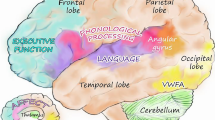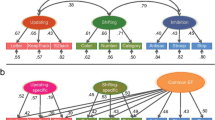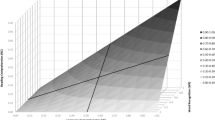Abstract
The present article is aimed to investigate whether there are any differences between youngsters and adults in their working and long-term memory functioning. The theory of Depth of Processing (Craik and Lockhart in J Verbal Learning Verbal Behav 11:671–684, 1972) discusses the varying degrees of strengths of memory traces as the result of differential levels of processing on the retrieved input. Additionally, they claim that there are three levels of visual, auditory and semantic processes applied on the stimuli in the short-term memory leading to discrepancy in the durability of the memory traces and the later ease of recall and retrieval. In the present article, it is tried to demonstrate if there are evidences of more durable memory traces formed after semantic, visual and auditory processions of the incoming language data in two groups of (a) children in their language learning critical age and (b) youngsters who have passed the critical age period. The comparisons of the results made using two-way ANOVAs revealed the superiority of semantic processing for both age groups in recall, retention and consequently recognition of the new English vocabularies by EFL learners.


Similar content being viewed by others
References
Allport, D. A. (1985). Distributed memory, modular subsystems and dysphasia. In S. K. Newman & R. Epstein (Eds.), Current perspectives in dysphasia (pp. 207–244). Edinburgh: Churchill Livingstone.
Anderson, J. R., & Reder, L. M. (1979). An elaborative processing explanation of depth of processing. In L. S. Cermak & F. R. M. Craik (Eds.), Levels of processing in human memory. Hillsdale, NJ: Lawrence Erlbaum Associates.
Baker, J. T., Sanders, A. L., Maccotta, L., & Buckner, R. L. (2001). Neural correlates of verbal memory encoding during semantic and structural processing tasks. Neuroreport, 12(6), 1251–1256.
Bradshaw, G. L., & Anderson, J. R. (1982). Elaborative encoding as an explanation of levels of processing. Journal of Verbal Learning and Verbal Behavior, 21, 165–174.
Caramazza, A., Hillis, A. E., Rapp, B., & Romani, C. (1990). Multiple semantics or multiple confusions? Cognitive Neuropsychology, 7, 161–190.
Craik, F. I. M. (2002). Levels of processing: Past, present and future? Memory, 10(5/6), 305–318.
Craik, F. I. M., & Lockhart, R. S. (1972). Levels of processing: A framework for memory research. Journal of Verbal Learning and Verbal Behavior, 11, 671–684.
Craik, F. I. M., & Tulving, E. (1975). Depth of processing and the retention of words in episodic memory. Journal of Experimental Psychology: General, 104(3), 268–294.
Damasio, A. R. (1990). Category-related recognition defects as a clue to the neural substrates of knowledge. Trends in the Neurosciences, 13, 95–98.
Dixon, R. A., & von Eye, A. (1984). Depth of processing and text recall in adulthood. Journal of Reading Behavior, 16(2), 109–117.
Fletcher, P. C., Stephenson, C. M., Carpenter, T. A., Donovan, T., & Bullmore, E. T. (2003). Regional brain activations predicting subsequent memory success: An event-related fMRI study of the influence of encoding tasks. Cortex, 39(4), 1009–1026.
Fliessbach, K., Buerger, C., Trautner, P., Elger, C. E., & Weber, B. (2010). Differential effects ofsemantic processing on memory encoding. Human Brain Mapping, 31(11), 1653–1664.
Fliessbach, K., Witt, J. A., Packheiser, J., Lehe, M., Elger, E., & Helmstaedter, C. (2011). Depth-of-processing effect on memory encoding after selective amygdalohippocampectomy. Behavioral Brain Research, 216, 402–407. C.
Grady, C. L., & Craik, F. I. (2000). Changes in memory processing with age. Current Opinion in Neurobiology, 10(2), 224–231.
Haarmann, H., & Usher, M. (2001). Maintenance of semantic information incapacity-limited item short-term memory. Psychonomic Bulletin and Review, 8(3), 568–578.
Kintsch, W. (1975). Memory representations of text. In R. L. Solso (Ed.), Information processing and cognition. Hillsdale, N. J.: Erlbaum.
Lambert, S. (1988). Information processing among conference interpreters: A test of the depth-of-processing hypothesis. Meta: Translators’ Journal, 33(3), 377–387.
Larson-Hall, J. (2008). Weighing the benefits of studying a foreign language at a younger starting age in a minimal input situation. Second Language Research, 24(1), 35–63.
Mazuryk, G. F., & Lockhart, R. S. (1974). Negative recency and levels of processing in free recall. Canadian Journal of Psychology, 28(1), 114–123.
Morris, C. D., Bransford, J. D., & Franks, J. J. (1977). Levels of processing versus transfer-appropriate processing. Journal of Verbal Learning and Verbal Behavior, 16, 519–533.
Moscovitch, M., & Craik, F. I. M. (1976). Depth of processing, retrieval cues, and uniqueness of encoding as factors in recall. Journal of Verbal Learning and Verbal Behavior, 15, 447–458.
Otten, L. J., Henson, R. N. A., & Rugg, M. D. (2001). Depth of processing effects on neural correlates of memory encoding: Relationship between findings from across- and within-task comparisons. Brain, 124(2), 399–412.
Paivio, A. (1971). Imagery and verbal processes. New York: Holt, Rinehart & Winston.
Roediger, H. L., & Karpicke, J. D. (2006). The power of testing memory: Basic research and implications for educational practice. Perspectives in Psychological Science, 1(3), 181–210.
Rose, N. S. (2010). A processing approach to the working memory/long-term memory distinction: Evidence from a levels-of-processing span task. Unpublished Doctoral Dissertation, Washington University, Saint Louis, Missouri.
Rose, N. S., Myerson, J., Roediger, H. L., & Hale, S. (2010). Similarities and differences between working memory and long-term memory: Evidence from the levels-of processing span task. Journal of Experimental Psychology: Learning, Memory, and Cognition, 36(2), 471–483.
Schulman, A. I. (1971). Recognition memory for targets from a scanned word list. British Journal of Psychology, 62, 335–346.
Shallice, T. (1988). From neuropsychology to mental structure. Cambridge: Cambridge University Press.
Shelton, J. R., & Caramazza, A. (1999). Deficits in lexical and semantic processing: Implications for models of normal language. Psychonomic Bulletin & Review, 6(1), 5–27.
Shulman, H. G. (1970). Encoding and retention of semantic and phonemic information in short term memory. Journal of Verbal Learning and Verbal Behavior, 9, 499–508.
Walla, P., Hufnagl, B., Lindinger, G., Imhof, H., Deecke, L., & Lang, W. (2001). Left temporal and temporoparietal brain activity depends on depth of word encoding: A magnetoencephalographic study in healthy young subjects. Neuro Image, 13(3), 402–409.
Wanger, A. D., Schacter, D. L., Rotte, M., Koutstaal, W., Maril, A., Dale, A. M., et al. (1998). Building memories: Remembering and forgetting of verbal experiences as predicted by brain activity. Science, 281, 1188–1191.
Warrington, E. K., & Shallice, T. (1984). Category specific semantic impairments. Brain, 107, 829–854.
Wickelgren, W. A. (1973). The long and the short of memory. Psychological Bulletin, 80, 425–438.
Acknowledgments
Our sincere gratefulness goes to Mr. Sabiza, the supervisor of Kalaam Institute, without whose contribution the data collection phase of this research could not be accomplished.
Author information
Authors and Affiliations
Corresponding author
Rights and permissions
About this article
Cite this article
Kheirzadeh, S., Pakzadian, S.S. Depth of Processing and Age Differences. J Psycholinguist Res 45, 1137–1149 (2016). https://doi.org/10.1007/s10936-015-9395-x
Published:
Issue Date:
DOI: https://doi.org/10.1007/s10936-015-9395-x




